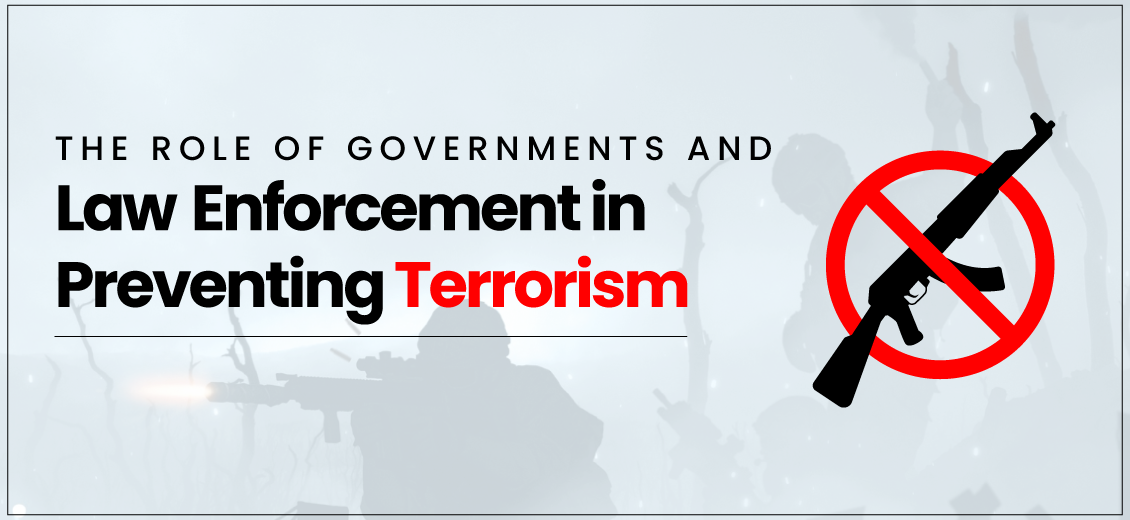

It is well known that terrorism has become a global phenomenon that threatens the life of ordinary citizens while standing as a major challenge in the face of a nation-state. With the advent of globalisation, as the world shrinks itself through new modes of communication and advanced technology, we witness the negative consequences of such heightened connectivity. What has often been termed as "new terrorism" or "global terrorism" is a harsh reality one has to face. It is true that national security regimes must invest too much in combating against terrorism, be it in terms of intelligence, human power, financial resources or otherwise.
If one tries to trace the beginnings of terrorism, it will become an exhausting process. However, it has been noted by various scholars and authors like Andrew Heywood, who points out that terrorism is not essentially a modern phenomenon. The focus of this blog is not on tracing the meaning or history of terrorism but rather on understanding the role of governments and law enforcement in preventing it.
On the 21st of May, every year, India observes National Anti-Terrorism Day. The history of the day goes back to the assassination of former Prime Minister, Mr. Rajiv Gandhi in a campaign of his party in Tamil Nadu. The day is a constant reminder that the government and nation must be united against the menace. As we remember the lives lost as a result of various terrorist activities, we also review and acknowledge the need to have more powerful measures against acts of terrorism.
In the post 9/11 world, the threat that terrorism poses has gained an international character. All the nations have seemed to realise the increased vulnerability that has been created to their security system. In such a scenario, the national governments have been pushed to take a front step in order to prevent the ever-looming danger of terrorist activities from growing beyond.
Various laws and Acts have been passed by the Government to combat terrorism. Often these laws have been a matter of debate and controversy. Some of these legislative measures that have existed or exist today, are:
Intelligence gathering is a manifestation of such an attempt on the government's part to prevent the spread of terrorism in their territory. The sophisticated technologies have made it possible to track and monitor any suspicious activity and this has saved innumerable tragic events from taking place. Yet, one cannot ignore that similar upgraded technologies are used by the terrorist camps to unleash their agendas.
Various measures are taken by the national governments to counter terrorism. This includes creating a rigid security environment, constant monitoring, or heightening security at public places & events. Strict procedures are undertaken to ensure there is no transportation of any threatening material from one place to another. These procedures are only necessary but not enough in themselves alone.
It would be worthwhile to mention the major law enforcement agencies of India, undertaking counter-terrorism operations.
1- National Investigation Agency: The first and foremost agency working at the central level to counter terrorism is the NIA. Established in 2009, in accordance with the NIA Act of 2008, it undertakes investigations in relation to terrorism that might pose national implications. NIA works in close coordination with other agencies at the central and state levels.
2- Intelligence Bureau: IB is the intelligence agency of India. The function of IB is to gather and analyse any intelligence in relation to terrorism that is provided to the law enforcement agencies. The activities performed by various counter terrorism agencies in regard to internal matters is largely based on the analysis of IB.
3- Research and Analysis Wing: RAW is also another intelligence agency. While IB deals with matters internal to the country, the focus of RAW is to gather intelligence in relation to any external threats. For this, RAW employs a variety of measures, including constant monitoring of the cross-border movements, or working in cooperation with foreign agencies. RAW was established in 1968.
4- Police Forces: Police play an active and important role in counter terrorism. At the level of States, there are various Special Task Forces (STFs) that carry out operations at the state level. At the level of the Centre, various paramilitary forces like CRPF, BSF, and CISF work to provide security. The work done by various forces are in close coordination with one another.
5- Finance Intelligence Unit: The FIU-IND is a central agency that is placed under the Ministry of Finance. While the unit plays various functions of collecting information in regard to suspicious financial transactions, it also traces the cases of money laundering and the sources of terrorist organisations.
One is well aware that the threat of terrorism has a global face. When such is the case, international cooperation becomes necessary to counter a global problem. As a result, the governments try to create & adhere to mutual agreements that are helpful to combat against terrorism. As of now, there is no international convention that supervises the sharing of vital information like that of intelligence and evidence between countries. A gap also needs to be fulfilled that can allow governments to mutually cooperate in extradition of suspects who have managed to escape in another country. In the same direction, India has submitted the Comprehensive Convention on International Terrorism in the UN General Assembly. If ratified, it would serve as a basis making all acts of terrorism as illegal.
The Indian government has taken various measures to prevent terrorism. Through means of legislation, it has enacted and amended laws to meet the challenge against terrorism. For instance, The Unlawful Activities Act of 1967 was recently amended in 2019. This was done to furnish more powers to the agencies concerned with security. The Government of India also collaborates and cooperates with the special agencies of different countries. We have cooperation with intelligence agencies of the USA, Israel and others that help to swap information related to terrorism or intelligence. The Indo-US Counter Terrorism Initiative was first discussed in 2009 that not only enhances the relationship between the two nations but also provides the opportunity to strengthen its capabilities by exchanging information in regard to technology, best practices, and their expertise. In 2022, the 19th meeting of the Counter Terrorism Joint working group was conducted. The Government of India has also initiated counter terrorism activities with the neighbouring countries of our South Asian subsystem like Bangladesh, Sri Lanka, to name a few.
Successful counter-terrorism operations:
Intelligence failures and lessons learnt: The 2008 Mumbai Terror attacks also known as 26/11 has often been quoted as an example of intelligence failure. The Uri Attack of 2016 targeted the army base of J&K. Agencies were criticised for not anticipating the attack. The 2019 Pulwama Attack that led to loss of 40 personnel has been a result of intelligence failure. Intelligence failures are, however, not unique.
Terrorism being a complex phenomenon poses various challenges. The lessons should be drawn from the previous failures and improvements should be made. Intelligence gathering can be improved with the help of new & modern technology advancements. Interagency collaborations need to be strengthened at various levels, and both within the national as well as internationally.
Challenges in addressing terrorism and efforts to address it:
Terrorism is on the rise today and it has been possible due to massive terror financing. There is no dearth of money for terrorist activities, which is evident from the rising number of cases of money laundering and concealed funds that are often pumped as charities. New century is also witnessing the rise of crypto currency, which being unregulated, can serve as a major source for funding terrorism.
Various states have been indirect sponsors of terrorist organisations, and this certainly demands strict actions by the international community. Ground reality is different from what is, than what ought to be. There is politicisation of most counter terrorist attempts in the UN Security Council where one or the other P5 countries exercise their veto.
Efforts:
In view of the above-mentioned challenges, one can say for sure that this is a global problem, which of course can work when solutions are not only given but implemented with willingness by all the members of the international community. For that to happen, the first and foremost requirement is to reach a definition of what constitutes as terrorism. Sanctions need to be implemented against those states who sponsor terrorist activities. An end to politicisation of terrorism is also necessary. International organisations like the United Nations need to become a platform to implement counterterrorism. Further, governments will need to cooperate mutually and continuously evolve themselves in their fight against terrorism since it's a debate of state vs non-state actors.
Sources:
Annie Pruthi

Annie Pruthi is pursuing her masters in Pol. Science from JMI, New Delhi and is a 1st division Arts graduate from Gargi College, University of Delhi. She is an avid reader and an award-winning author.